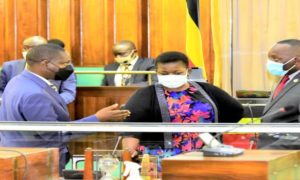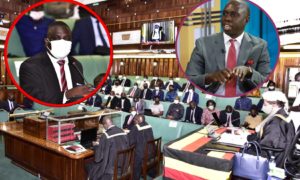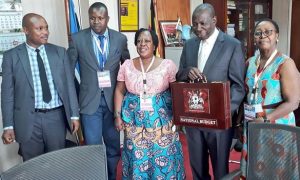
Lawmakers During Plenary
Parliament has debated the Budget Framework Paper (BFP) for the Financial Year 2018/2019, with the Energy and Works sectors topping projections for next year’s allocations.
In the Majority Report presented by the Budget Committee Chairperson, Hon. Amos Lugoloobi (NRM, Ntenjeru North) , the national budget projections for financial year 2018/2019 suggests minor variations from its predecessor.
The Ministry of Works and Transport, the most financed sector in the current financial year at Ushs 4.5 trillion, tops next Financial Year’s projections with Ushs 4.7 trillion.
This is followed by the Ministry of Energy and Mineral Development, which is tentatively allocated Ushs 2.5 trillion from Ushs 2.3 trillion, the current Financial Year’s allocation.
The Ministry of Education and Sports is set to suffer a slight reduction from the current Ushs 2.8 trillion to the projected Ushs 2.7 trillion. Domestic Revenue, on the other hand, is projected to rise from Ushs15.9 trillion to Ushs16.8 trillion.
According to the Budget Framework Paper, the total resource inflow for Financial Year 2Ol8 /19 is projected to increase from Ushs 29 trillion in Financial Year 2Ol7/18, to Ushs 29.2 trillion in 2018/2019.
The BFP attributes the projected increase in the resource envelope to an anticipated rise in domestic revenue collections by the Uganda Revenue Authority and external financing by donors.
“The increase in resource inflow is attributed to increase in domestic tax revenues. The increasing budget support may indicate that the donor community is slowly re-gaining confidence in the country’s reformed financial management systems,” reads the Report in part.
The BFP, however, faults government for persistent procrastination on the provision of Uganda’s employment statistics in the BFP, a requirement of the Public Finance Management Act.
The Committee reports that in defense of government, Finance Minister Matia Kasaija (NRM, Buyanja) said, “the rate of employment and unemployment are not collected on a regular basis and are therefore not available.”
On alignment of the national budget with the National Development Plan (NDP), the framework paper expresses pessimism about the achievement of the middle income target by 2020. This is because the projections note a gross misalignment with the NDP.
Of the 127 Ministries, Departments and government Agencies, only 31 have fully aligned their budgets to the NDP II; a key indicator of the nation’s preparedness to achieve the much famed Middle Income Status in 2020. In Local Governments sector, only 33 out of the 157 are aligned to the NDP.
The Budget Committee pressed an alarm button on poverty, saying the trends point to an upsurge in poverty especially in the rural areas. “The rural areas with about 76 percent of the population contribute 86 percent of national poverty. On the other hand, the urban areas represent 24 percent of the population and contribute 14 percent of national poverty,” the report noted.
The rising poverty, notes the report, can only be reversed by balancing allocations between social and infrastructural development. “To reverse the worsening poverty indicators; there is need to balance social and infrastructure spending so as to ensure economic growth does not leave anyone behind. Towards this end, the planning and budgeting frameworks need to learn from what has gone wrong and where redirection is required.”
MP Margaret Baba Diri (NRM, Koboko) said government should equally lay emphasis on areas of direct social impact other than the near strict adherence to infrastructure.
“I know we need infrastructure, we need roads. But I think we should also invest in human capital. We put a lot of money in roads but over Ushs1 trillion is going to be returned to the national treasury because it was unspent by UNRA [Uganda National Roads Authority],” said Baba Diri.
Hon. Judith Alyek (NRM, Kole) said that community access roads should be equally prioritized as much as the national roads.
“National roads are getting more money than the community roads. The communities are much more interested in the [community] roads because that is what their children use to go to school,” said Alyek.
A Minority Report presented by MP Muhammad Kivumbi (DP, Butambala) said the cost of roads in Uganda is inflated, asking Parliament to keenly interest itself in the matter. “It was also noted with concern that unit costs of externally funded roads are quite inflated as compared to costs in the region,” partly read the report.
MPs Cecilia Ogwal (FDC, Dokolo) and Robert Centenary (FDC, Kasese Municipality) raised the same concerns.
Section 9 of the Public Finance Management Act requires the BFP to be passed by the 1st of February every year. Presentation of Ministerial Policy Statements follow, leading to passing of the Budget estimates by May 31 2018 as required by the Public Finance Management Act.




























